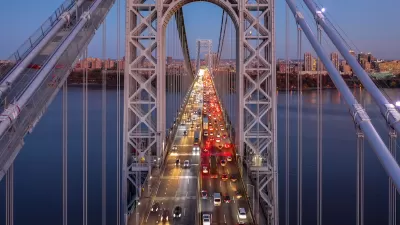By partnering with banks, real estate developers and nonprofit groups, New York City will assist some 10,000 buildings to convert to cleaner fuel, a major step in reaching PlaNYC's goal of having the cleanest air of any major U.S. city.
New York City is accelerating its push to get cleaner fuel into the city's buildings. Alex Goldmark explains the challenge, "Just one percent of buildings in New York still burn heavy forms of heating oil, but those 10,000 polluters spew more soot than all the vehicle traffic in the whole city." This heavy and cheap oil, called Number 6, is estimated to cause 3,000 deaths each year.
To help these buildings convert to cleaner heating fuels, the city launched NYC Clean Heat, a program that provides information about technical help, financial help, and regulations. The conversion process will be expensive for each building, but the city wants to alleviate some of the financial pressure.
"The city partnered with banks, real estate developers and nonprofit groups to structure plans to fund $100 million in boiler conversions and offer other resources like technical consulting to help the process along. ‘By phasing out heavy heating oils, we are closer to achieving our PlaNYC goal for the cleanest air of any major U.S. city,' said Mayor Bloomberg as he touted a new target to reduce soot pollution by 50 percent by 2013, something he estimates will save 120 lives and preventing 300 asthma-related hospital visits."
According to Fred Krupp, president of the Environmental Defense Fund, "Upgrading these buildings to cleaner heating fuel is the single largest step New Yorkers can take to solve local air pollution."
FULL STORY: New York City's Dirty 10,000 Get Paid To Clean Up

Alabama: Trump Terminates Settlements for Black Communities Harmed By Raw Sewage
Trump deemed the landmark civil rights agreement “illegal DEI and environmental justice policy.”

Study: Maui’s Plan to Convert Vacation Rentals to Long-Term Housing Could Cause Nearly $1 Billion Economic Loss
The plan would reduce visitor accommodation by 25% resulting in 1,900 jobs lost.

Why Should We Subsidize Public Transportation?
Many public transit agencies face financial stress due to rising costs, declining fare revenue, and declining subsidies. Transit advocates must provide a strong business case for increasing public transit funding.

Wind Energy on the Rise Despite Federal Policy Reversal
The Trump administration is revoking federal support for renewable energy, but demand for new projects continues unabated.

Passengers Flock to Caltrain After Electrification
The new electric trains are running faster and more reliably, leading to strong ridership growth on the Bay Area rail system.

Texas Churches Rally Behind ‘Yes in God’s Back Yard’ Legislation
Religious leaders want the state to reduce zoning regulations to streamline leasing church-owned land to housing developers.
Urban Design for Planners 1: Software Tools
This six-course series explores essential urban design concepts using open source software and equips planners with the tools they need to participate fully in the urban design process.
Planning for Universal Design
Learn the tools for implementing Universal Design in planning regulations.
Caltrans
Smith Gee Studio
Institute for Housing and Urban Development Studies (IHS)
City of Grandview
Harvard GSD Executive Education
Toledo-Lucas County Plan Commissions
Salt Lake City
NYU Wagner Graduate School of Public Service




























